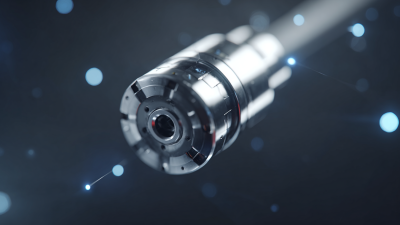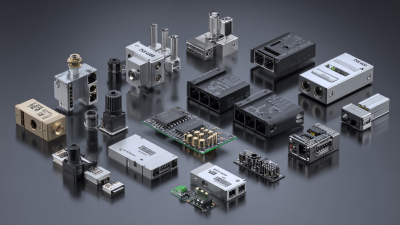Exploring the Future of Automotive Technology: The Rise of Connector Cars and Their Impact on Smart Transportation
Table of Contents
- The Emergence of Connector Cars: Defining the Future of Mobility
- Understanding the Technology Behind Connector Cars and Their Connectivity Features
- Evaluating the Market Growth: Statistics on Connector Cars Adoption by 2025
- The Role of Connector Cars in Enhancing Urban Smart Transportation Systems
- Impact on Safety: How Connector Cars Are Reducing Traffic Accidents from 2020 Data
- Environmental Benefits: Connector Cars and Their Contribution to Sustainable Transportation
- FAQS
- Conclusion
- Related Posts
In this fast-changing world of car tech, the idea of the 'Connector Car' is really gaining ground. As vehicles become more like smart gadgets on wheels, the need for top-notch automotive connectors—like the ones Yueqing Xulian Electronics Co., Ltd. makes—is growing like crazy. I came across a recent industry report from MarketsandMarkets that predicts the global market for these connectors will hit over $28 billion by 2025. That’s mainly because of the surge in smart transportation and electric vehicles.

These tech advances really show how vital connectors are for smarter cars—helping them stay connected, supporting fancy driver-assist features, and making communication within these smart transportation systems smoother. As a company that deals with automotive connectors, ECU connectors, and wiring harnesses, Xulian is actually in a great position to help shape this new connected car future, making sure the tech infrastructure keeps up with our interconnected world.
The Emergence of Connector Cars: Defining the Future of Mobility
You know, the rise of connector cars really marks a big step forward in the world of mobility. They're pretty much built to work smoothly with all kinds of digital services and infrastructure around us. As the auto industry keeps evolving, we're seeing more and more talk about Vehicle-to-Everything (V2X) tech — it’s like cars chatting with each other and the city itself. This not only makes driving safer but also helps manage traffic better, moving us closer to smarter, more efficient transportation solutions. Thanks to some pretty cool advances in sensors and connectivity, cars can now talk to each other and to traffic systems, which means our entire transportation ecosystem is becoming more connected and responsive.
Back in 2020, the car tech scene hit a kind of breakthrough moment when new policies sped up the rollout of these innovations. Construction of demonstration zones kicked into gear, and different players in the automotive world started working together to push innovation forward and boost the adoption of connector cars. These efforts are so important—they’re redefining how we move around cities, offering features like real-time traffic info, automated driving, and better overall user experiences. This shift isn’t just changing how consumers think about cars; it’s also influencing urban planning and public transit, leading us into a future where mobility is more integrated, efficient, and just plain smarter.
Understanding the Technology Behind Connector Cars and Their Connectivity Features
You know, the rise of connector cars is really changing the game when it comes to smart transportation. I came across a report from McKinsey that says the number of connected cars sold is set to jump from about 33 million in 2020 to roughly 130 million by 2030. Crazy, right? This huge leap is mainly thanks to advanced tech like 5G, which makes it possible for vehicles to talk to each other, roadside infrastructure, and cloud systems in real-time. As more cars get Internet of Things (IoT) features, they can share info like traffic jams, maintenance alerts, or even safety risks on the fly. That’s making driving safer and way more efficient.
And it’s not just about sharing data—these connectivity features are opening up some pretty exciting possibilities. Gartner projects that by 2025, about three-quarters of all new cars will be connected in some way. That’s a huge deal because it’s paving the way for things like self-driving cars and smarter traffic systems. These systems make use of all that shared data to keep traffic moving smoothly, cut down on congestion, and even reduce emissions. As connector cars keep improving, they’re actually helping create smarter, greener transport networks—changing the way we get around in our cities and making urban driving a lot better overall.
Evaluating the Market Growth: Statistics on Connector Cars Adoption by 2025
You know, the automotive world is really buzzing right now with all these advances in connector car tech. It’s pretty exciting! Experts are saying that by 2025, the global market for Ethernet controllers could hit around $10.27 billion—crazy, right? And by 2033, it might skyrocket to about $16.76 billion. That’s a huge jump, and it’s mainly because more and more cars are getting smarter, needing better connectivity features. As these connected cars become the norm, they’re also going to make it easier for vehicles to sync up with smart city systems—think seamless data sharing that helps with traffic flow and safety. Pretty neat stuff, if you ask me.
On top of that, the market for industrial Ethernet connectors isn’t left behind. It’s projected to grow from $8 billion in 2025 to around $12.8 billion by 2032, which is roughly a 7% compound annual growth rate—that’s steady growth, showing just how crucial good communication systems are becoming in vehicles. Whether it’s autonomous driving or vehicle-to-everything (V2X) tech, these developments are really changing how vehicles interact with the world around them. It’s like we’re all heading toward a future where cars are smarter, safer, and more connected than ever before.
The Role of Connector Cars in Enhancing Urban Smart Transportation Systems
Connector cars are really set to shake up how we get around in cities. They’re designed to smoothly connect with smart infrastructure, making the whole system work more seamlessly—linking vehicles, pedestrians, and city services like never before. These cars use the latest tech, like Vehicle-to-Everything (V2X), to share data in real time. That means they can communicate with traffic lights, road signs, and even each other, which helps improve traffic flow and keep everyone safer. When cars chat with their surroundings, they can choose better routes, cut down on congestion, and help prevent accidents. All in all, it’s leading to a much smoother, more efficient urban travel experience.
But it’s not just about individual rides. The spread of connector cars actually opens the door for smarter, more sustainable transportation. By looking at patterns and user behaviors, cities can figure out how to expand public transit options or improve pedestrian and cycling paths—making city life more friendly and accessible for everyone. So, connector cars aren’t just about convenience; they’re helping build cleaner, smarter cities that focus on efficiency and protecting the environment. It’s pretty exciting to think about how this will change the way we move around daily.
Exploring the Future of Automotive Technology
Impact on Safety: How Connector Cars Are Reducing Traffic Accidents from 2020 Data
You know, the rise of connector cars is really shaking up how we think about road safety. Back in 2020, data showed that these cars use pretty advanced tech to chat with each other and with roadside infrastructure—all in real time. It’s kind of like having a built-in sixth sense. Thanks to this connected network, car systems can spot potential trouble spots—like a car suddenly braking or swerving—and react before things get out of hand. Honestly, it’s a game changer because it can seriously cut down the chances of accidents. Plus, by crunching data and running predictive algorithms, these cars not only keep themselves safe but also boost safety for everyone on the road.

And here’s the cool part: when these connected vehicles become part of smarter transportation systems, safety shifts from being purely reactive to proactive. Vehicles sharing real-time info mean fewer mistakes made by humans—the main cause of most crashes, unfortunately. And because all these cars are talking to each other, traffic moves more smoothly, and congestion drops, which means fewer fender benders and pile-ups. As this tech keeps improving, I really believe connector cars will keep transforming how safe—and maybe even enjoyable—driving can be for everyone out there.
Environmental Benefits: Connector Cars and Their Contribution to Sustainable Transportation
The rise of connector cars really marks a pretty big shift in automotive tech—making transportation smarter and a lot more eco-friendly. These cars come packed with connected features that let them chat with each other and talk to our city infrastructure. It’s kinda like giving vehicles their own little network! This connectivity doesn’t just make the cars perform better; it also helps cut down on pollution. By smoothing out traffic and choosing smarter routes, connector cars can lower emissions and save fuel, which is a win for cleaner cities and a healthier planet.

Yueqing Xulian Electronics Co., Ltd. is right there at the cutting edge of this tech wave. We supply the key connectors and parts that keep these clever cars connected and running smoothly. Our products—like ECU connectors and wiring harnesses—are built to meet the rising demands of these smart transportation systems. We focus a lot on quality and innovation, ensuring our connectors help boost the efficiency and sustainability of connector cars. It’s all about paving the way for a greener, cleaner future in the auto industry—and we’re excited to be part of that journey.
FAQS
: Connector cars are vehicles that can integrate seamlessly with various digital services and infrastructures, enhancing mobility through technologies like Vehicle-to-Everything (V2X) communication.
Connector cars enhance traffic management by sharing real-time data with traffic infrastructure, enabling optimized routing, reduced congestion, and increased safety.
The market for Ethernet controllers in connector cars is projected to reach $10.27 billion by 2025 and $16.76 billion by 2033, driven by the demand for smart transportation solutions.
Connector cars facilitate the implementation of sustainable transportation solutions by analyzing data to enhance public transit options and improve pedestrian pathways, promoting a greener urban environment.
Technologies such as advanced sensor systems and V2X communication are integral to the functionality of connector cars, enabling them to exchange information with urban infrastructure and other vehicles.
Connector cars enhance user experiences by providing features like real-time traffic updates and automated driving capabilities, which lead to safer and more efficient travel.
The adoption of connector cars influences urban planning by necessitating the development of infrastructure that accommodates advanced vehicle communication and enhances overall transit systems.
The policy changes in 2020 created a favorable environment for the development and implementation of connector car technologies, driving collaboration among various automotive stakeholders.
Connector cars can communicate with city services, including traffic lights and road signs, to enhance mobility and safety, making urban transportation systems more coordinated.
The maximal adoption of connector cars is expected to lead to a transformation in how vehicles interact within their environment, resulting in smarter and more efficient transportation solutions.
Conclusion
So, I came across this article titled "Exploring the Future of Automotive Technology: The Rise of Connector Cars and How They're Shaping Smart Transportation," and honestly, it got me thinking about how these Connector Cars could really change the game in mobility. Basically, it explains what Connector Cars are—these cars with super advanced connectivity features—and how they’re helping to make urban transport smarter and more efficient. It’s pretty exciting because market projections suggest a huge jump in their popularity by 2025, and the article shares some key stats that really drive that point home.
What’s even more interesting is the chat about safety and environmental perks. According to 2020 data, Connector Cars have helped reduce traffic accidents, which is huge. Plus, they’re contributing to greener, more sustainable transportation options. As someone involved in high-tech manufacturing, Yueqing Xulian Electronics Co., Ltd. is in a prime spot to support making these smart, connected vehicles happen. Basically, it’s all about moving toward a future where our transportation is smarter, safer, and more eco-friendly—and I think we’re definitely heading in that direction.
Related Posts
-

Finding High Quality Suppliers for Best Automotive Crimp Connectors in a Competitive Market
-

The Future of Auto Wire Connectors in a Connected World
-

Exploring Innovative Female Connector Applications in Modern Technology
-

Superior Tyco Amp Solutions from China Elevating Global Standards
-

Innovative Solutions for Tyco Connectors Integration in Modern Applications
-

Unlocking Efficiency: The Untapped Advantages of Best Car Cable Connectors for Global Buyers
Blog Tags:

